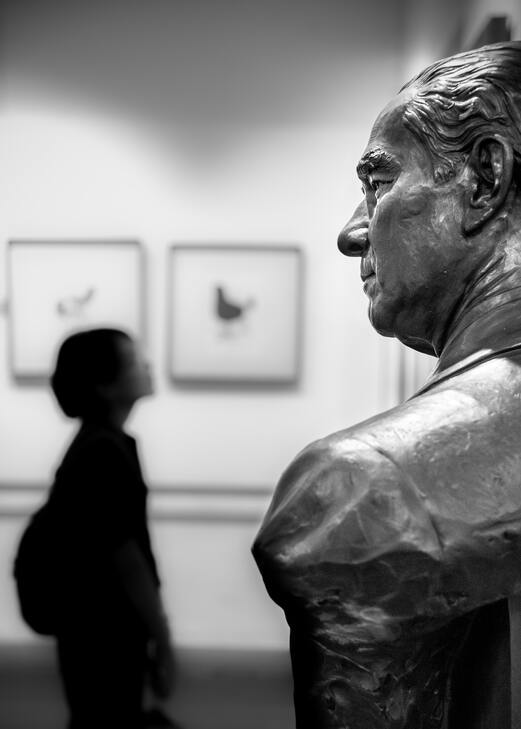The world is in peril. Residents of Lake-town have experienced the same earthquake-like event that the Dwarves have felt under their feet. They are all aware of what has been aroused within the mountain to produce it. They all fear for their lives and the turn their fates will take once that sound escapes the confines of a mountain. And still within that same mountain a lonely Hobbit is conversing with a dragon.
The heirloom
Smaug: “The King Under the Mountain is dead. I took his throne. I ate his people like a wolf among sheep. I kill where I wish, when I wish. My armor is iron, no blade can pierce me.”
Bard: “All right.”
Bain: “A Black Arrow? Why did you never tell me?”
Bard: “Because you did not need to know.”
As a contradiction to the statement Smaug makes, the subsequent scene shows the exact weapon that can pierce the dragon’s hide. Very nicely edited and foretelling of what will come to pass. Bain is, of course, not too thrilled to not have been kept in the loop. But still his father is certain to have acted in his best interest, keeping the arrow from becoming a part of his knowledge at such a young age.
The Black Arrow in their family is more of a curse than a blessing. It brings about only sour memories of their forefather not ridding the world of the dragon when he first came. It is no wonder then that Bard had kept it hidden from everyone, for it could have only been a source of shame for the family who has had their lives plagued by misfortune.
There is no need to provoke any more feelings of low self-worth and insecurity. Bard has had enough grief in his life to want to avoid those feelings altogether.
Instruction
Bard: Listen to me carefully. I need you to distract the guards. Once I’m at the top of the tower, I’ll set the arrow to the bow.”
Braga: “There he is! Bard! After him!”
Bard: “Quickly! Down there. Go!”
Braga: “Stop him!”
Guard1: “Stop him!”
Braga: “Stop!”
Bard: “Bain! Bain. Keep it safe. Don’t let anyone find it. I’ll deal with them.”
Bain: “I’m not leaving you.”
It is, of course, commendable that a son would want to stand behind his father as the law is trying to catch up with him. However, a parent’s responsibility of shielding his son from persecution and pain is the very core of the protective instinct that he has toward his offspring. It is only logical for a parent to put themselves in harm’s way to keep their children safe.
It is not a behavior one can take for granted to be found in every parent for there are many different types of parents as there are many different kinds of people. Therefore, Bard’s reaction is very commendable and gives us an insight into the relationship he has with his children.
The plan is already in motion. Bard figures it sooner rather than later to reach the windlance and prepare for the attack of the dragon. He is in possession of the one weapon that can skew the possibility of victory in their favor and as such a fair amount of responsibility is lying on his shoulders. Whatever he can do to protect his children and the people of Lake-town, he will do it, at the expense of his own life.
Ambush
Bard: “Now go!”
Bard: “Braga.”
Braga: “You’re under arrest.”
Bard: “On what charges?”
Braga: “Any charge the Master chooses.”
Guard2: “Where’s he gone?”
The guards follow Bard across the pathways of Lake-town. Though they keep quite close to his whereabouts, in one turn of the corner, Bard evades them. However, they are not the only ones in pursuit. Alfrid, who has been skulking in a dark corner appears just as Bard runs in his direction. He trips Bard with his foot, bringing him to the ground. The Master then comes out of the shadows as well knocking Bard out with a piece of wood.
Meanwhile, Bain takes the Black Arrow his father had entrusted him with and hides it in a boat, under some fishing equipment. The hiding spot of the arrow is almost the same as before, hidden in plain sight, right under the statue of the Master of Lake-town himself. Easily retrievable when the time comes.
Changing of state of mind
Ori: “What about Bilbo?”
Thorin: “Give him more time.”
Balin: “Time to do what? To be killed?”
Thorin: “You’re afraid.”
Balin: “Yes, I’m afraid. I fear for you. A sickness lies upon that treasure hoard. A sickness which drove your grandfather mad.”
With fear in his own eyes Thorin turns to face and acknowledge the same fear in Balin. However, their fears do not concern the same person. For Thorin to fear for Bilbo’s life is naturally justified, but it would seem that although there is concern found in him, he does not hesitate to let the Hobbit be by himself in the dragon’s lair, fleeing for his life.
For all Thorin knows, Bilbo may already be dead. Though fear comes out in his eyes, there is another look that far surpasses it. His eyes show the beginning signs of the madness that Lord Elrond had warned Gandalf about.
In the reality of the situation, that particular shift in thought is witnessed by Balin who rightly concludes that if this were not the case he would have taken steps inside the mountain to try and protect Bilbo from harm. It is one thing to let him go alone when there was a possibility of Smaug not being able to smell him and therefore remain sleeping.
Now, however, having heard the dragon rummaging through their home, the choice of hanging back knowing that a valued member of their company is in danger comes off as negligent. Thorin is aware of the threat that Bilbo is facing, but at the same time, he considers his life insignificant enough to leave him alone inside the mountain.
Concern and foretell
Thorin: “I am not my grandfather.”
Balin: “You’re not yourself. The Thorin I know would not hesitate to go in there….”
Thorin: “I will not risk this quest for the life of one burglar.”
Balin: “Bilbo. His name is Bilbo.”
Balin is right to fear for Thorin’s sanity as it begins to slip. But there is little he can do aside from reminding him that his friend is not a burglar but a Hobbit with a particular name. For Thorin to reduce Bilbo to his contractual denomination is to view him as a means to an end rather than a part of a conscious collective and a valued friend of his.
I like the fact that while uttering “I am not my grandfather” Thorin’s facial profile aligns with that of the statue of his grandfather. It represents an acknowledgement of the madness that is beginning to take hold. It also foretells that the same will happen to him as it did to his grandfather.
Follow me to my next post.
Featured image by Arisa Chattasa on Unsplash





